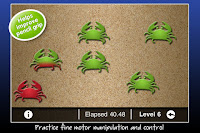By providing controlled activities you can help them develop fine motor skills and build confidence. The activities do not need to be target based but more about having fun, learning what fingers do and sharing experiences. The opportunities for learning are endless, bring in numeracy, colour or conversation skills for a multi-faceted learning experience!
1.) Hide small objects in playdoh.... Kids love Playdoh, we all know that, but it acts as a brilliant resistant material to help build muscles in the fingers and hands. Hide beads or coins inside fist sized lumps and encourage the children to search for the treasures. They could make piles of like items, by colour or size. Then swap over, let the children enjoy burying things for you to find. One of the things that I have noticed, is that children with reduced motor skill ability struggle to make round balls out of Playdoh or similar materials. Help to develop this skills by having a ball race! Make as many balls as you can and lay them side by side to make the longest run, enjoy counting your balls and working out the difference :)
2.) Beading.... Girls will especially love this one! Use laces of different thicknesses, beads of different shapes and sizes and get beading. Create bracelets for friends or family. Encourage team work by working in pairs. This activity really helps develop hand-eye coordination and is fab for developing pincer control.

3.) Finger and cotton bud painting.... Let's get messy! Have a ruless painting session (just cover your best sofas first!) Use fingers and hands to paint words or pictures. Develop finger control by using small items, such as cotton buds, to make marks with. Sensory seekers will love this opportunity to explore textures.
 4.) Counting songs.... Putting down one finger at a time is harder then you may think. By engaging children in counting songs such as 3 little monkeys, you will be helping to develop digit isolation, strengthening fine motor skills. Other good songs include Tommy Thumb and 5 fat sausages.
4.) Counting songs.... Putting down one finger at a time is harder then you may think. By engaging children in counting songs such as 3 little monkeys, you will be helping to develop digit isolation, strengthening fine motor skills. Other good songs include Tommy Thumb and 5 fat sausages.
5.) Lego.... brilliant for pincer control, force and helps with the identification of shapes and colours. Use large or small Lego pieces to suit ability and age. Build towers, form names or buildings to enhance hand-eye coordination. Lego is a brilliant way to foster sharing and manners, encourage conversation and discuss their builds.




















